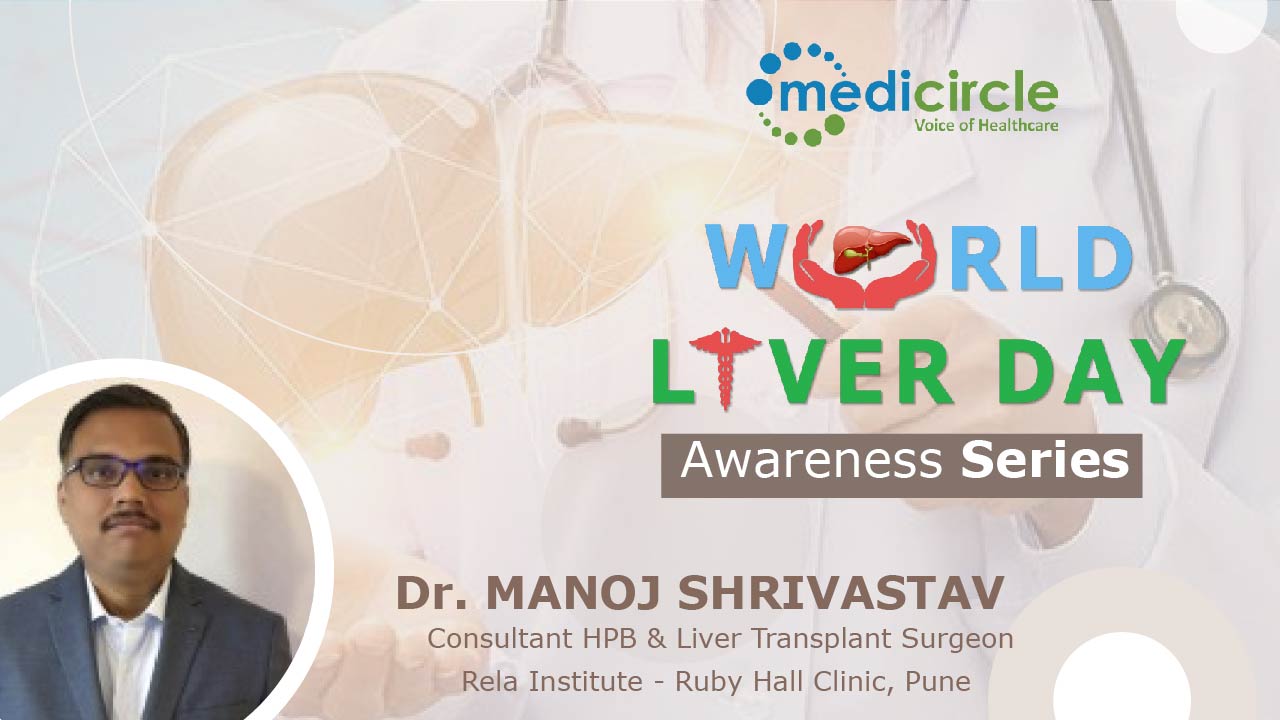The Liver is the second largest and the most complex organ in the body, with the exception of the brain is a key player in our body's digestive system. It is an organ that can be easily damaged if you don't take care of it. Over the past decade, there has been a steady rise in the number of cases of liver diseases, and it continues to be a significant health problem in India. On this World Liver day, we at Medicircle are presenting the World Liver Day Awareness Series, featuring eminent Gastroenterologists and Hepatologist to share their views on how we can keep our liver healthy.
Dr. Manoj Shrivastav is a specialized HPB surgeon and liver transplant surgeon in India. He is a consultant surgeon in the department of HPB surgery and liver transplantation doctor at Dr. Rela Institute and Ruby Hall Clinic in Pune. he has experience in complex hepatobiliary surgeries and has been involved in the management of over 1500 liver transplants patients.
Dr. Manoj Shrivastav says, “The commonest symptom for the general population for liver is a yellowish discoloration of eyes or dark urine. This generally develops when the lover is significantly damaged. As far as a preventative point of view is concerned, one has to focus on liver health. The symptoms of liver disease are as follows:
Tiredness Backache Upper abdominal pain Weight gain or loss Leg swelling Abdominal swelling Pleural effusion Blood vomiting Weakness Fatigue Jaundice Vomiting Fluid in the abdominal cavity
The liver is a very vital organ and does about 500 functions."
Vaccination for hepatitis is important
Dr. Shrivastav says, “Ideally, everyone should have their liver tested for the three common viruses which can cause liver damage. Out of these, the Hepatitis B virus is very serious and the most common. In earlier days, these viruses were not tested frequently. Even for people who had surgery or blood transfusion before the 1990s, the protocols were not in place. So, the chances of people getting infected with hepatitis were very high. So, every individual should take precautions to get tested for hepatitis B and C morbidities. If you are negative for hepatitis, it is important to get vaccinated”.
BMI is important to keep the fatty liver in check
Dr. Shrivastav informs, “For fatty liver, it is important to keep weight in check. BMI is very important to calculate and should be less than 24. Those with a BMI of more than 30 are considered obese and are at a higher risk of developing fatty liver. Patients having higher BMI must check their liver once a year with USG abdomen and Liver Function Tests. A routine check-up is a must above the age of 40 years even if BMI is normal.”
Tips to prevent fatty liver
Dr. Shrivastav states, “Fatty liver is a disease of lifestyle which can cause harm to the liver.
It is important to take care of nutrition or food habits. A sedentary lifestyle like just working on computers where there is no energy involved causes a higher risk of fatty liver. The sedentary lifestyle and working patterns are affected due to this COVID19 as well. Weight control is very important. It is important to manage your weight and keep your BMI less than 24. Alcohol is also one of the important factors which should be avoided completely if you have fatty liver. Alcohol intake can aggravate the fatty liver problem. Alcohol should be strictly avoided. Healthy exercise is very important in liver disease. Diabetes: India is a center of type 2 diabetes which usually develops into metabolic syndrome and can lead to fatty liver. It is important to control diabetes with regular medications and exercise. Obesity surgery can help in weight reduction. Monitor the calories you consume and the correct food. Gradually increase your exercise as your stamina improves.”
Maintaining a healthy liver is very important
Dr. Shrivastav states, “Medicines have a very limited role to maintain a healthy liver. It is important to take note of the following points:
Water: It is important to have a good amount of liquids and hydrate yourself. A healthy diet is also important. Include a protein-rich diet with fewer carbohydrates. Daily calorie consumption should be no more than 1500-2000 calories. Olive oil is the best oil for the diet.
(Edited by Dr. Rati Parwani)

 Dr. Manoj Shrivastav informs about the maintenance of healthy liver with his special expertise for the overall well-being of an individual. He informs about the importance of BMI and maintaining liver with a healthy lifestyle.
Dr. Manoj Shrivastav informs about the maintenance of healthy liver with his special expertise for the overall well-being of an individual. He informs about the importance of BMI and maintaining liver with a healthy lifestyle.





.jpeg)
.jpeg)
_(1).jpeg)

.jpeg)


.jpeg)
_(1)_(1)_(1).jpeg)
.jpeg)





.jpeg)

.jpeg)

.jpeg)
.jpeg)
.jpeg)
.jpeg)




